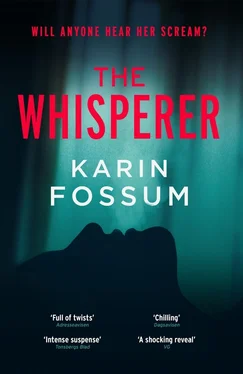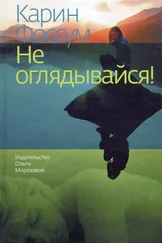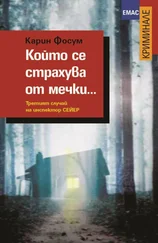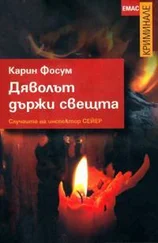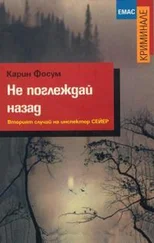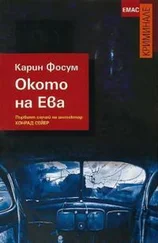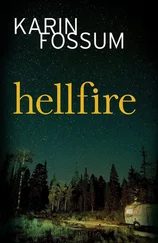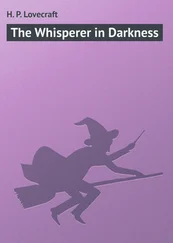But now everything was still as a grave, the old house resting undisturbed on its foundations. She had not heard a car door shut or an engine start. She had managed to cough up most of the soapy water, but her throat was still burning. She regretted slightly having cut the wire. Presumably the poor soul who had been standing out there, no doubt a shivering salesperson, or a child collecting money for the school brass band, or a deaf-and-dumb student from Lithuania with some not very good drawings, had moved on. She allowed herself to sink back down into the water. She had no idea what time it was, and she was exhausted, but not sleepy. She remembered it was December. People would come knocking at the door until Christmas now, selling smoked salmon and Christmas biscuits. Beware of the dog, she thought. Whoever had been at the door was not afraid of dogs.
The water was cold and opaque. Ragna opened the window so the steam would evaporate, put on her clothes and crept into the hall, where she turned the key as quietly as possible and opened the door. The air was ice cold. She looked to see if a folder or brochure had been left on the step. ‘We came, but you were not home. We would like to remind you of our services and hope to see you next time.’ But there was nothing there. She looked down at the road. Maybe whoever had been at the door had left something in the mailbox.
She went back in, locked the door, and attached the security chain. She should be tired and relaxed after the hot bath, but she felt agitated. She swept through the house, turned on the television and the computer and all the lights and lamps, and looked out at the street light on the road, but there was no one there. She popped four Apodorm out of the tray and swallowed them, then four more. What did it really matter if she was awake or asleep, or something in between? The time would pass all the same, the days, weeks and years, until she was with her parents again. She actually longed to be there. As she washed down the pills with some water, she laughed silently, at herself and her own indifference. She laughed at all the others too, all the effort and fuss they put into being something or getting noticed, and living as long as possible, please dear God. If only she could make a noise, just once. Go out onto the veranda and cup her hands round her mouth and wake all of Kirkelina, screaming so loud that the windowpanes exploded. But if she tried, it would be no more impressive than a snake’s hiss. She took off her clothes again and turned in. The pills had an immediate effect, and she barely managed to find a comfortable position before she was hurtling down a deep shaft, falling and falling, her arms and legs out in every direction like a cat that had to land on its feet at any cost. As she fell, she dreaded the moment she would reach the bottom, as she had never fallen at such speed from such a height, and she did not believe for a moment that someone would be there to catch her.
There was nothing in the shaft. It was dark and hard to think, and it got narrower and tightened into a funnel. There was barely room to move, she had to press her arms into her body, she was caught, the shaft closed in around her, until she finally stopped. There was not a sound, not a glimmer of light that reached her. The dark was damp and green, like a well, she had no feeling of time, could not feel her own body, the only thing she registered was that something was preventing her from moving, a clamp or a band. A week passed, a month, a year. A whole life passed. And then finally, she started to rise again, slowly to a higher level, and gradually there was more space. It was no longer so quiet, there was more and more noise. A clanking, rattling and banging in her head, and she rose and rose. After an eternity she broke the surface, but the ascent did not stop, she continued to rise up into a tower to new, dizzying heights, and the sounds that reached her were no longer in her head, they were outside. It was the traffic on Kirkelina. A bus, someone honking their horn. And broad daylight.
She discovered it was eleven o’clock and there were three missed calls on her mobile phone. Gunnhild had rung. Slowly she recalled everything that had happened. She was in a new day and everyone else was far ahead of her. She realised that in the hours that followed she would pay for falling down that shaft and climbing the tower. The price would be a heavy head, and a body that she could barely drag across the room. The silence and dark had enveloped her in a protective embrace where no one and nothing could reach her, not the shrill ring of the alarm clock, not her mobile phone and Beethoven’s Fifth Symphony. But it did not last for ever. She had forgotten to open the bedroom window and the air in the room was saturated with her breath and fear. She turned over on her side and for a moment hung over the edge of the bed, staring down at the synthetic rug with a Persian pattern. Decisions had to be made. Messages had to be answered. Lights had to be switched on. Somehow or another, her feet had to get to the floor and she had to take those arduous steps to the bathroom. She had never weighed more than fifty kilos, but now it felt like she weighed a hundred. Most of that weight was in her head, she reckoned, her brain was like a solid block of cement. Even her spinal cord fluid was thick and infected, like the bathwater the evening before, and there was no longer any contact between her brain and body. Not so strange then that her feet were not behaving. There was no earthly reason to get up. All the day would bring was either an empty mailbox with no card from Rikard Josef, or a mailbox with a threat. So she turned back to face the wall and closed her eyes. In her head, she heard scornful laughter, directed at her, Ragna Riegel, the Ugly, the Miserable, the Persecuted. The Lonely, the Abandoned, the Wretched. The coward who could not get out of bed, who crept around like a thief. She was also very thirsty. She had never been so thirsty. The tablets had dried out her mouth and tongue, she would not be able to say a single word even if she had to. She turned on the bedside lamp, the poisonous red toadstool with its 25-watt bulb, and pushed herself up onto her elbow. And then she saw the folded piece of paper. Someone had left a note, there, at the foot of the toadstool. A message. She lay for a long time staring at the piece of white paper. Closed her eyes and opened them again, but it was still there. She did not touch it. Instead she tried desperately to remember what had happened the previous evening. She froze in that uncomfortable position, resting on one elbow. Looked around the room to see if there was anyone there, if the door out to the hall was open, anything. But she saw nothing, heard nothing, not even a puff of air. She had been lying in a well all night where no sound could reach her, not the alarm clock, not her mobile phone. Someone had managed to come into the house, into her bedroom, while she lay at the bottom of the shaft and was deaf and blind. He had stood by her bed and looked at her in the dark, listened to her breathing. He had perhaps noticed that she was breathing heavily.
The connections in her body short-circuited again. The orders from her brain were not getting through. Her hand would not listen. It took a long time before she finally managed to pick up the piece of paper and read the message.
‘I AM CLOSER THAN YOU THINK.’
It did not matter that she had no voice, she would never have dared use it anyway. She was more concerned about listening to what was going on in the room, outside the door, in the hall.
If he was still there. All she could hear was the noise from Kirkelina, the steady hum of cars heading towards town, and every now and then the heavier throb of a lorry or bus. Her eyes moved around the room, looking feverishly; nothing had been moved, no one had touched the curtains, the bedroom door was shut, as it should be. She tried to work out how he had got in. She understood why she had not heard him, she had taken eight Apodorm. All the same, breaking open a door or window would make quite a noise, even if he did have good tools. She was sure that she had locked the door and that the security chain was on, as usual. He might still be in the house, maybe he was standing in a corner waiting, in the living room or the cellar. She had another thought, an important one. She remembered the telephone conversation with the police officer on duty who had not believed her. The note, the handwritten note that she was holding in her hand, was indisputable evidence. Someone was threatening her. And he was becoming dangerous. The thin paper was presumably covered in the secretions from his fingers, his unique loops, whorls and arches that no one else had. If the fingerprints matched any of those they already had on record, they could arrest him. Confront him, punish him. She held the note with great care, was not going to destroy it or burn it, but instead take it with her. Go to the police station and put it down on the counter.
Читать дальше
